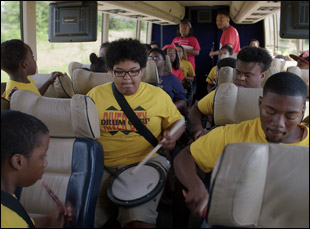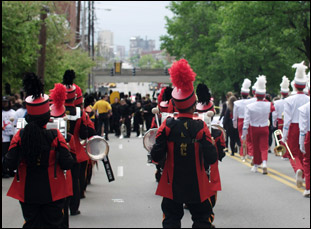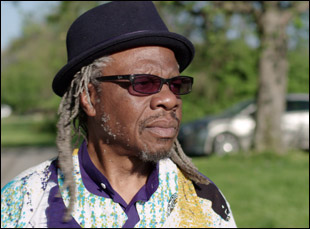Even if they didn’t have an an inherent rhythm to play with when embedding with the River City Drum Corp, Anne Flatte and Marlon Johnson were bound to make some beautiful music together in “River City Drumbeat.”
“It’s like jazz,” laughs Johnson. “We are put together on these projects because of the toolsets that we have and our life experiences, but also our own biases and aesthetics. Anne and I lined up in so many ways and that’s what you come to a film like ours for is our own specific instincts. Someone else would’ve gone through the same experiences and made a completely different film, but this is our mark.”
Ironically, you shouldn’t notice much of the filmmaking in “River City Drumbeat” when the two pull you into the West End of Louisville, Kentucky so thoroughly that more than a few times you may feel like you’re guiding where the camera is pointing as opposed to the other way around. However, Flatte and Johnson approach the remarkable story of Edward “Nardie” White and the impressive program he’s built up in the historically marginalized African-American neighborhood through a different lens than most inspirational tales like these are told, attuned to capturing small but meaningful changes that have incrementally instilled confidence in the area’s youth, not unlike the steady progress one makes towards mastering a new piece of music in the often unglamorous hours of practice and persistence.
As Mr. White says at one point in the film, “There’s a lot of good things happening in our community, I’ve just stopped to take the time to appreciate it,” making Flatte and Johnson’s portrait of him all the more special when it creates that space to reflect. “River City Drumbeat” checks in with the band leader as he’s about to hand off his baton to Albert Shumake, one of the first to benefit from the drum corps Mr. White started after working as a director at the local Boys and Girls Club. After wondering if there were activities beyond sports that could bring a community together, Mr. White found inspiration in African percussion as part of a greater cultural reawakening initiated by his wife Zambia, and while his last year at the helm of a successful program may give the film shape, Flatte and Johnson honor him with expressing how progress, both personally and collectively, is on its own timeline and takes a myriad of forms as they track a few current members of the drum line starting to think about life after high school and see Mr. White follow his own muse towards another artistic medium.
It’s a story that Flatte and Johnson could no doubt relate to as artists who found their way into filmmaking through music and were brought together through the producer Owsley Brown, yielding a collaboration that echoes the River City Drum Corp’s ability to bring out harmony from a variety of places. With the film now making its way into virtual cinemas following a festival run that began last fall at DOC NYC, the filmmakers spoke about how they joined forces, the film’s inviting structure and keeping the spirit alive of a subject that’s passed away.
Marlon Johnson: Both Anne and I had separately worked on music documentaries for a very long time and our executive producer Owsley Brown is from Louisville and knew of the organization and of Mr. White, so when Mr. White decided to retire, that’s when they decided there was a sense of urgency to tell a story of the drum core. One unique thing that we did was we didn’t even film at first. I just came in and spent some time with the organization and saw how much I had in common with Mr. White and with Albert, who was about to transition into taking over the program. I fell in love with their story, I fell in love with their organization and with the community and just wanted to allow them to tell us the story they wanted to have portrayed.
Community really seems to be at the heart of this when of course you’ve got a central story of Mr. White passing the baton to Albert, but even then you make the film more about the group than individual arcs. Was that always how you envisioned this?
Anne Flatte: Mr. White is such an incredibly strong personality and has such a great life experience, you can just tell when you meet him how strong he is. Yet in this community that he and his late wife Zambia created for themselves, he helps all the people in it, so we knew it was very important to let the community emerge in the story. We were invited into this community by Mr. White and then we just listened a lot and I always say there were so many other stories that we could’ve included, but finding the balance within a 90-minute film is really tricky. It really was more about community, less about competition and there were so many themes that resonated with that collective effort that we were trying to portray.
Marlon Johnson: Yeah, and also as storytellers, we allowed ourselves pretty early on the space for the unknown. Being patient and present, and the later we get in our careers, the more as storytellers and as artists we do feel comfortable anticipating the unknown.

Anne Flatte: We were very committed to have an experiential film, a film where you feel like you are there in the car with Albert and you just get to know people in the same way you would get to know somebody by spending time and not kind of checking things off a list. It was very organic in that way, and then when you get into editing, there’s this temptation to really simplify or speed it up, all of these things that we’re told we have to do and we were just like, “We’re not going to do that.” [laughs] We were really committed to the people that we wanted to portray, even though there were a lot of them in the film. One of the characters that really emerged was Zambia because she was not alive when we were making the film. She passed away in 2010. And yet we kept hearing about her from everybody and it was so clear that her presence and her legacy was so strong. A lot of what we wanted to look at was legacies and leadership and community and she was all that. So how to portray this person that is essentially living in memory, that was really a challenge and we really committed to that, so that was something that I don’t think we knew going in.
Marlon and I are also very influenced by fiction films, so we felt strongly that we wanted this to be an emotional journey, not an informational journey because that is what we experienced getting to know these people. We didn’t see the need to put IDs on people and things like that.
Marlon Johnson: Yeah, when we decided to not be as conventional with the way we were telling the story editorially, it makes it that much more difficult, but so much more satisfying. So often people who screen the film walk away feeling like they personally know the participants that’s always a sign that we’ve gotten something right.
It’s interesting to hear you talk about the role of Zambia because her story becomes part of one of the ways you’re able to show influence, which can be so abstract, and a big part of that seems to come from your decision to parse out her story over the course of the film rather than directly introducing her upfront. Did that decision come naturally?
Anne Flatte: It’s everything that we intentionally talked about doing and another thing was how of get this presence of Zambia in the film all the way throughout where it’s emerging, like you’re saying, and then you finally see this person who’s had such an influence, so there was a lot of discussion in the edit room about how to do that. We enjoy films like that where you’re along for the journey and we’re active participants in viewing and laying these little clues, so it is a challenging structural thing.
Marlon Johnson: And like Anne is saying, it’s asking something from our audience. We want to respect their intelligence and hope that they are willing to do a little bit of work because that to us is enjoyable.

Anne Flatte: It’s true. I was trained as a musician and you’re coming back to that beat every time and even though it is repetitive, that is why it works. It’s like that is what keeps people grounded, so that’s part the beauty of what musical training does. We all know there’s a lot of benefits to that, so we decided to make a film that was trying to get at some truths that we as human beings have seen in the world. It wasn’t just about being entertaining. It was trying to make something that’s so important in the world that doesn’t get a lot of screen time, which is arts education in an organic way.
Marlon Johnson: And an even more specific point about the musicality and the drumbeat incorporated into the editing, the choice to use the youth pledge [Mr. White instills in the Drum Corp] three times like we did and the magic of three and the cadence, both within their performance and as it related to the film, was intentional.
Anne Flatte: The pledge just made such an impact on all of us and when you put it in different juxtapositions, it takes on different meanings every time it appears in the film. The kids say this pledge every day, so you can see how it just resonates.

Marlon Johnson: It premiered at 2019 DOC NYC, [where] it sold out three screenings, and the second screening at DOC NYC was really special for us because it involved high school-aged performing arts kids. I am a graduate of the High School of Performing Arts, so it was really near and dear to my heart, and to see them embrace the film and really be moved by it was really special, so DOC NYC was very good to us. We also were very fortunate to have it screen in Miami at the Miami Film Festival and that is my hometown, so that also goes without saying that it was special. We were able to bring a high school band that is from the neighborhood I grew up in, which is similar to the West End and have them perform and enjoy the film.
Anne Flatte: We consider ourselves very fortunate to have been able to premiere this film in a movie theater with people, given where we are now. Of course, we were scheduled for a number of spring festivals, but then were either cancelled or moved online like SXSW Edu, so we have taken the energy that came from those live screenings and tried to move it into the virtual realm. We were fortunate enough to be healthy and so is Mr. White and Albert – we count our blessings – and the drum core went virtual, and we wanted to still continue to connect with people about the film, so we have done many community and education screenings. Now we’re doing this virtual cinema release and we love meeting with people in any way that we can. Like everybody, we have had adapt to this really momentous change that has happened and we’re just doing the best we can like everybody else.
“River City Drumbeat” is now available through virtual cinemas, splitting proceeds to support your local arthouse. A full list of participating theaters is here.





